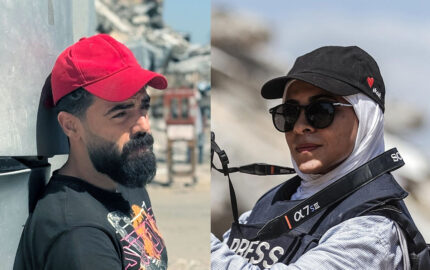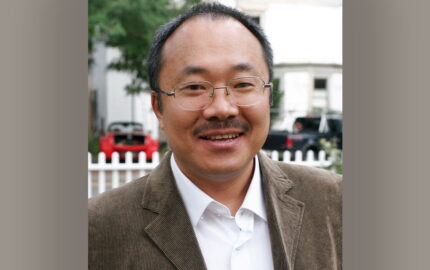Martin Gehlen, NF ’92, a respected Middle East expert and correspondent from Germany died in Tunis on February 6, 2021. His classmate Melissa Ludtke remembers his life and work.
Melissa Ludtke, NF ’92
Martin Gehlen dedicated his life to doing the best of what journalism can be. He approached his work with passion and perseverance as he sought to pass on to his readers what he believed, after all of his reporting, to be as close to truth as he could bring them on that day. He was an avid reader, and even with floor-to-ceiling bookshelves there were piles of overflow books on his floor and tables. He was a scholar, too, with his doctorate in American studies. I soon realized in conversations with him that he knew far more about my country than I did. His brilliance shined through in his foreign news coverage due to the in-depth preparation he did to write about current events in lands where he was a visitor. Martin read widely so he’d know the history of how people he knew he’d be writing about arrived at a moment in their nation’s complex and evolving history. Because of this, Martin’s stories wove the news of today seamlessly into the quilt of people’s yesteryears.
I met Martin in 1991 when we began our year at Harvard University together in a class of Nieman Fellows. Our shared interests drew us to enroll in several classes together, including a course on welfare policy at the Kennedy School. On our walks to and from those classes, we shared many stories about our lives, fast cementing our bond as lifelong friends. Several years later, his book about the American effort to rework its welfare policy was published in Germany.
When I was researching my 1997 book, “On Our Own: Unmarried Motherhood in America,” I stayed for two weeks with Martin in Berlin after he’d generously set up interviews for me with unmarried mothers who had lived on either side of the Berlin Wall, which had come down a few years before. By accompanying me on interviews and translating, when necessary, he made my reporting possible. With his assistance, I spoke with unwed moms in the former East Berlin, where they raised kids in a socialist economy, and with moms raising children on their own in West Berlin's capitalist economy. And in our discussions to and from these interviews, Martin offered me insights on how what I was hearing fit in the context of Germany's family and children policies. On our drives and subway rides, the bonds of our friendship deepened.
It was during my trip to Berlin that Martin introduced me to Kati, the woman he was dating. Soon, the three of us were going on all kinds of adventures together, including day trips to Leipzig and Potsdam and walks through Berlin. Being with Martin and Kati, I felt their love for each other burn though. Within a short time, I received word of their marriage.
On visits to America—to Cambridge, Massachusetts for Nieman reunions and in Washington, D.C.—we reconnected in joyful, splendid moments. I drove Martin to visit my beloved Cape Cod , and my family adored him, of course. When my father was diagnosed with a fatal brain tumor, Martin and Kati hosted them during a visit to Berlin; my dad gushed about his time with them calling it a journey of his lifetime. It meant everything to me that Martin and Kati had extended themselves in this way for my parents.
Several years later, when my daughter, Maya, and I went to Venice, Martin and Kati were working in Egypt with Martin as a foreign correspondent and Kati as a freelance news photographer. I asked if they'd consider flying north to join us in Venice, and soon arrangements were made. In four magnificent days together, we must have walked every step of Venice. Our deal was that Martin chose where we'd eat since he had with him an authoritative guide of the most incredible Venetian food. He was right every time. We'd never eaten so well as we did with Martin showing us the way.
Martin leaves with his 1992 Nieman classmates, who met over Zoom soon after his death in a celebration of his life, the indelible memory of his generous heart and brilliant mind, his contagious smile and the extraordinary kindness of a good soul.
Melissa Ludtke, NF ’92
Martin Gehlen dedicated his life to doing the best of what journalism can be. He approached his work with passion and perseverance as he sought to pass on to his readers what he believed, after all of his reporting, to be as close to truth as he could bring them on that day. He was an avid reader, and even with floor-to-ceiling bookshelves there were piles of overflow books on his floor and tables. He was a scholar, too, with his doctorate in American studies. I soon realized in conversations with him that he knew far more about my country than I did. His brilliance shined through in his foreign news coverage due to the in-depth preparation he did to write about current events in lands where he was a visitor. Martin read widely so he’d know the history of how people he knew he’d be writing about arrived at a moment in their nation’s complex and evolving history. Because of this, Martin’s stories wove the news of today seamlessly into the quilt of people’s yesteryears.
I met Martin in 1991 when we began our year at Harvard University together in a class of Nieman Fellows. Our shared interests drew us to enroll in several classes together, including a course on welfare policy at the Kennedy School. On our walks to and from those classes, we shared many stories about our lives, fast cementing our bond as lifelong friends. Several years later, his book about the American effort to rework its welfare policy was published in Germany.
When I was researching my 1997 book, “On Our Own: Unmarried Motherhood in America,” I stayed for two weeks with Martin in Berlin after he’d generously set up interviews for me with unmarried mothers who had lived on either side of the Berlin Wall, which had come down a few years before. By accompanying me on interviews and translating, when necessary, he made my reporting possible. With his assistance, I spoke with unwed moms in the former East Berlin, where they raised kids in a socialist economy, and with moms raising children on their own in West Berlin's capitalist economy. And in our discussions to and from these interviews, Martin offered me insights on how what I was hearing fit in the context of Germany's family and children policies. On our drives and subway rides, the bonds of our friendship deepened.
It was during my trip to Berlin that Martin introduced me to Kati, the woman he was dating. Soon, the three of us were going on all kinds of adventures together, including day trips to Leipzig and Potsdam and walks through Berlin. Being with Martin and Kati, I felt their love for each other burn though. Within a short time, I received word of their marriage.
On visits to America—to Cambridge, Massachusetts for Nieman reunions and in Washington, D.C.—we reconnected in joyful, splendid moments. I drove Martin to visit my beloved Cape Cod , and my family adored him, of course. When my father was diagnosed with a fatal brain tumor, Martin and Kati hosted them during a visit to Berlin; my dad gushed about his time with them calling it a journey of his lifetime. It meant everything to me that Martin and Kati had extended themselves in this way for my parents.
Several years later, when my daughter, Maya, and I went to Venice, Martin and Kati were working in Egypt with Martin as a foreign correspondent and Kati as a freelance news photographer. I asked if they'd consider flying north to join us in Venice, and soon arrangements were made. In four magnificent days together, we must have walked every step of Venice. Our deal was that Martin chose where we'd eat since he had with him an authoritative guide of the most incredible Venetian food. He was right every time. We'd never eaten so well as we did with Martin showing us the way.
Martin leaves with his 1992 Nieman classmates, who met over Zoom soon after his death in a celebration of his life, the indelible memory of his generous heart and brilliant mind, his contagious smile and the extraordinary kindness of a good soul.


